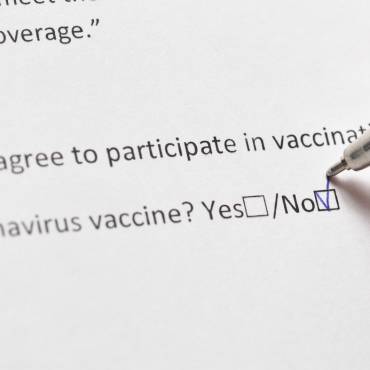Eczema Vaccinatum From His Smallpox Vaccinated Dad
On March 3, 2007, a 2-year-old boy was hospitalized with eczema vaccinatum. His two siblings, one with eczema, were subsequently removed from the home. Swabs of household items obtained on March 13th were analyzed for orthopoxvirus DNA signatures with real-time PCR. Virus culture was attempted on positive specimens. Eight of 25 household samples were positive by PCR for orthopoxvirus; of these, three yielded viable vaccinia virus in culture. Both siblings were found to have serologic evidence of orthopoxvirus exposure. These findings have implications for smallpox preparedness, especially in situations where some household members are not candidates for vaccination.
Source: Vaccine, Volume 27, Issue 3, 14 January 2009, Pages 375-377 – we’re not at that date yet but I guess this will be the publication date of the journal.
VAN UK’S Comment: ‘Vacca’ means cow and vaccinia is the virus from cowpox which was used to formulate smallpox vaccine
Woman Gets Smallpox After Having Sex with Smallpox Vaccinated Soldier!
After having sex with a soldier recently vaccinated against smallpox, a young woman in Washington state developed an illness caused by the vaccinia virus used in the shot, US health officials report.
This type of viral transmission, while rare, is not unheard of, according to the US Centres for Disease Control and Prevention.
“The patient visited an urgent care clinic with painful, ring-shaped vaginal swelling,” explained Andrea McCollum, an Epidemic Intelligence Service Officer with the CDC. “A few days before that, she had sexual contact with her boyfriend who was a recent smallpox vaccinee via the military.”
Although smallpox is now almost eradicated, US military personnel have been vaccinated in recent years as a precaution against the potential use of the virus in a biological attack. The smallpox vaccine comes in the form of a live vaccine, so there is always some risk of infection, McCollum said. “The vaccine is not smallpox virus,” she stressed, “but it’s a closely related virus called vaccinia.”
Second doc confirmed diagnosis
Although the woman told her doctor about her possible exposure to smallpox vaccine via sexual contact with her recently vaccinated boyfriend, the doctor tested her for common STDs but did not test for vaccinia, according to the report published in the CDC journal Morbidity and Mortality Weekly Report.
Despite taking the antibiotics and antiviral medications that the doctor had prescribed, the woman continued having lesions and pain for the next three days, McCollum said.
A second doctor then sent her to an infectious disease specialist who confirmed that she had the vaccinia virus.
Vaccinia is relatively mild compared to smallpox, and the woman did not need any specific treatment. She did suffer some pain, soreness and irritation, which eventually resolved, McCollum said.
However, “we were quite concerned that she might transmit it to her household contacts,” McCollum said, because one of her roommates had had a kidney transplant. The transplant patient was immunosuppressed and taking a lot of medication. “A vaccinia virus infection, particularly in an immunosuppressed individual, can be very serious and life-threatening,” McCollum noted.
Other cases out there
McCollum noted that there have been other cases of this infection transmitted from smallpox-vaccinated individuals to others. “At CDC, we don’t know about every case of vaccinia that occurs,” she said.
Including this case, the CDC is aware of five similar cases occurring over the past year, she said. “All the cases were women presenting with genital lesions that had had recent sexual contact exposure to military vaccinees.”
In addition to military personnel, others who are vaccinated include some health care workers and laboratory personnel who work with the virus, McCollum said.
In terms of immunisations generally, McCollum said the danger of transmitting a virus via a recent vaccination is present with vaccines that contain what’s known as live virus. Most vaccines – including most childhood and flu vaccines – are made from the killed virus, and therefore pose no such danger, she said.
Infectious disease expert Dr. Marc Siegel, an associate professor of medicine at New York University in New York City, said that “smallpox vaccine being a live virus, there is a two-to-three-week period when you are still infectious from the vaccination site and you have to be very careful to cover it.”
Source: Health24.com, News, 2nd July 2010.
http://www.health24.com/news/Infectious_diseases/1-922,56977.asp
This is the MMWR Report on it: http://www.ncbi.nlm.nih.gov/pubmed/20592687

